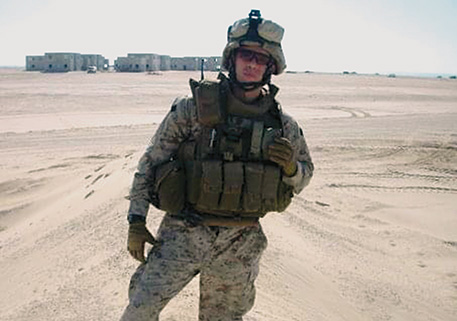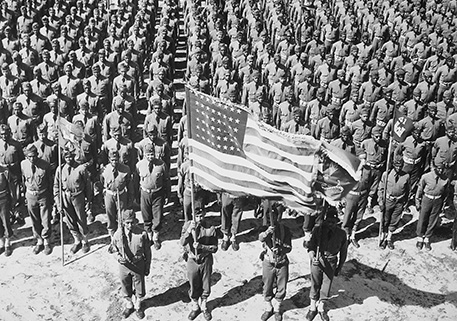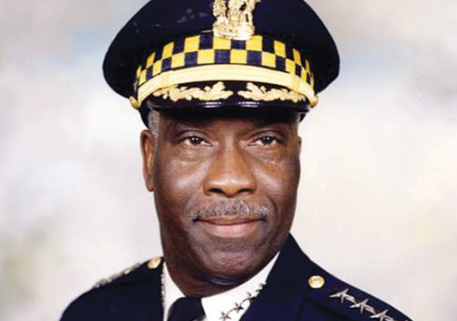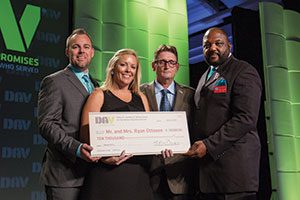
Veteran-owned businesses are in decline, but a Syracuse University program aims to reverse the trend
An impressive 49.7% of veterans went on to run or own businesses in the aftermath of World War II, followed by 40% of Korean War veterans. But according to the Bureau of Labor Statistics, entrepreneurship has taken a nosedive among the most recent generation, with just 4.5% of post-9/11 veterans launching their own businesses.
This drop may also have an impact on employment opportunities for other veterans.
One reason for the decline may be that today’s veterans have different resources than their predecessors. While the post-9/11 and forever iterations of the G.I. Bill are considered some of the most generous in terms of the overall provisions for veterans, they don’t provide access to low-interest loans to start a business like the benefit did for World War II veterans.
“Limited access can force today’s veterans to seek other options when pursuing their dream of having their own business”.
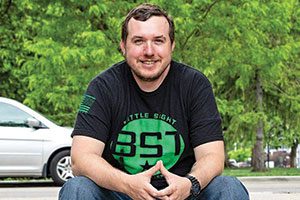

One such program that has made an economic impact for veterans is the Entrepreneurship Bootcamp for Veterans (EBV), run by the Institute for Veterans and Military Families at Syracuse University in New York. The no-cost program opens the door for veterans by developing their proficiencies in the many steps and activities associated with creating and sustaining an entrepreneurial venture.
“I cannot personally recommend this program enough. They had a positive impact on Battle Sight every single step of the way,” said Army veteran Nick Ripplinger, owner of Battle Sight Technologies, a company that develops infrared chemiluminescent products to aid war fighters on the battlefield.
Ripplinger received the 2019 Arthur H. and Mary E. Wilson Award for his performance in EBV’s business plan competition, the Acceleration Challenge. The award—which was created to honor past DAV’s past national adjutant and his wife—comes with a $10,000 cash prize that serves as a springboard for new veteran-owned businesses.
“The [award] was a win for Battle Sight,” Ripplinger said. “The cash award allowed us to save money by placing a larger quantity order, and the exposure of the award helped get our name out to a larger audience.”
Marine Corps veteran Ryan Ottosen graduated from EBV in 2012 and received the award in 2016.
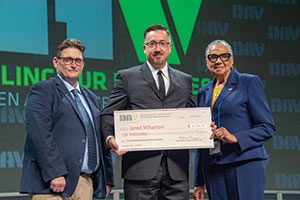

“If you’re thinking of opening up your own business, do your homework, get a business plan, get a clearly defined goal, hire a coach, get an attorney, get an accountant and go get it,” said Ottosen, who started property management company Ottosen and Co. in 2013. “Sign up for EBV. Take care of your family, take care of your mortgage, make sure your home is dialed in and then just go get it.”
The 2018 recipient of the award was Army veteran Jared Wharton, who credits his military service with helping him overcome challenges in starting Forward Operating Base Brewing Co.
“I know from experience that sweating in peacetime saves lives during wartime,” said Wharton. “Put in the work every day, and the difficult days won’t seem that difficult. I’m still working through challenges every day. Starting a business is easy. Running a business is hard. Every single element of a business presents its own challenges, difficulties, costs and learning curve.”
Wharton, Ottosen and Ripplinger understand the obstacles associated with launching a new company, but all say they would encourage other veterans to jump in and get started.
“You have to start,” Ripplinger said. “There is not a business in the world that got off the ground without massive action.”
“We have to continue to serve, and we can impact change in our communities through business ownership,” said Ottosen. “The greatest generation was the greatest generation, yes, because they defeated evil. But then they came home and worked. They came home and changed everything with their work ethic, with their vision, with their commitment and with their loyalty.”
Learn more
To learn more about EBV, visit ebv.vets.syr.edu. If you have a veteran-owned small business, you may qualify for advantages when bidding on government contracts—along with access to other resources and support—through the Vets First Verification Program. To learn more, visit dav.la/11z.

